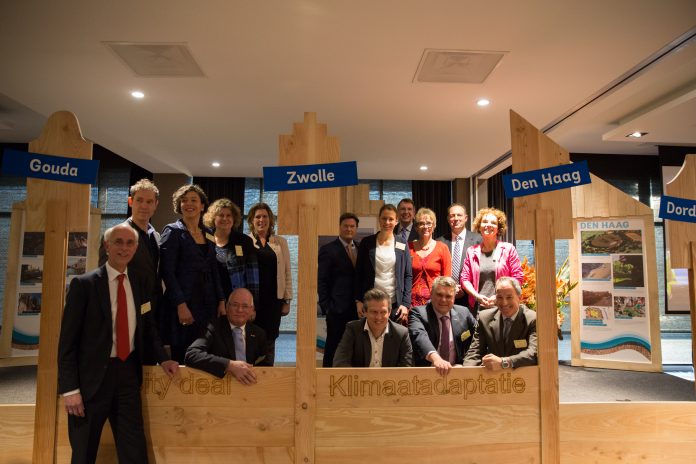At the conference ‘Water safe and climate resilient building, living and life’ in Zwolle, the Netherlands, five Dutch cities, governmental organisations and regional water authorities jointly signed a ‘City Deal’ for climate adaptation. On both national and international levels, the Climate Deal partners will collaborate to reinforce their approach for a climate-resilient design of the urban environment and commit to become innovation and practical learning centres over the next four years.
“Working on climate adaptation in the urban area requires specific local knowledge,” Edyta Wisniewska, Project Manager Water & Urban, Netherlands Water Partnership, one of the 16 partners who signed the deal, told The Source. “Each city has already started with developing knowledge and specific approaches. City deal partners will create a practical learning environment for innovation and collaboration that helps initiate and develop climate proof and water safe projects in the cities. The agreement fits the growing belief that an integrated water and urban approach is impossible without engaging a wide range of stakeholders at an early stage.”
As part of the City Deal, the parties will intensify their cooperation in an open learning, experimental and innovating culture, through collaboration in real working practices. The lessons learned will be shared with other parties, including educational organisations.
“Last year’s floods in Europe, (UK, Germany, Italy, Balkans), those in Southeast Asia and the impact of Hurricane Sandy along the east coast of the United States prove that ignoring climate change and climate resilient actions is not an option,” added Wisniewska. “Rising sea levels and extreme weather conditions are facts, with every human being already experiencing the consequences of too much, too little and too dirty water.”
An example of an innovative solution for climate-resilient cities is the noise barrier of Stadshagen, a district of the Dutch city Zwolle, which functions as a dam in case of floods and has formed an extra safety precaution along with the dikes of the rivers Ijssel, Vecht and the Zwarte Water. In future this ‘second layer’ could be extended to the southeast side of the city.
“The relationship between a city and water has traditionally been about the risk caused by flooding from the sea or river,” said Wisniewska. “Due to climate change, there is an increasing risk caused by extreme rainfall in a short period. The Dutch recognise the need to undertake urgent action by joining their forces to provide integrated solutions. These solutions are not only needed around a city, such as dikes, but also in the city itself. Cities and regional water authorities want to learn from each other, inspire each other and exchange their local knowledge. This is what the City Deal is for.”
The partners that signed the City Deal include the cities of The Hague, Dordrecht, Gouda, Rotterdam and Zwolle, the Dutch Ministry of Infrastructure and Environment, the water boards of Drents Overijsselse Delta, Schieland and Krimpenerwaard, and Delfland. Other parties are Ecoshape, Heijmans, BPD, Foundation Kennisland, Tauw, Netherlands Water Partnership and Rotterdam Centre for Resilient Delta Cities.








